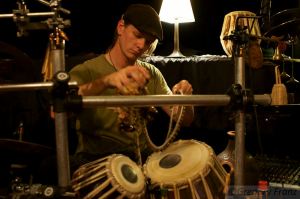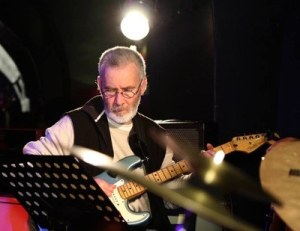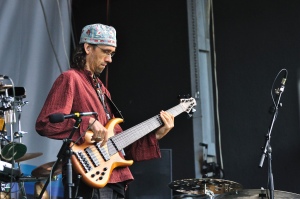Terms like ‘folk’ and ‘world music’ have become so overused in music writing that they risk being robbed of all content. Folk music is correctly applied only to music traditions developed over time by specific communities, although it certainly also includes contemporary revisionists in those traditions. World music? We probably shouldn’t use that one at all in serious discussion, because it obscures more than it reveals. But the labels are constantly used by critics for sounds they can’t situate within the limits of their knowledge, and by marketers to provide a convenient label on a sales shelf. Concealed under them, you can find anything down to and including banal pop with the sonic equivalent of Ndebele triangles tacked around the edges.
The group Deep South has borne both labels – and should not be associated with any of the above.

The core duo of percussionist Ronan Skillen and pianist/guitarist Dave Ledbetter employ sounds and textures from diverse traditional sources (such as Skillen’s tabla and didgeridoo), the instruments are acoustic, and there is definitely something reminiscent of folk song in the clean, memorable simplicity of their melodic lines. But that merely describes the palette they draw from, not what they do with it.

Heartland, their second album, launches at 7:30pm on Saturday 14 November at the Reeler Theatre of Rondebosch Boys High School in Cape Town (tickets from Quicket or at the door). Collaborator and producer for this outing was ECM artist, Swedish bassist Bjorn Meyer; guests included bass clarinettist Jan Galega Bronnimann, trumpeter Samuel Wurgler and percussionist Fredrik Gille.

The listener is better off without those deceptively handy labels. Drop the preconceptions, and you’ll hear music that is improvised – but not conventionally jazzy; melodic – but not glibly pretty; and intimate – but not small in vision. Oh, and clever, creative, thought provoking and intriguing.
The ten album tracks shift across a varied moodscape and soundscape: from the tightly-woven, intensely empathetic patterning of Awagawan to the rolling open spaces of Clovelly. One delight is the way a sound or texture – the breathing of a bass clarinet; the embroidery of the tablas; the precise cat-footing of Wurgler’s trumpet – will shift into and out of prominence in the mix, gracefully ceding to another. There’s no jousting for solo space and no ostentatious demonstration of virtuosity: it’s a dance, not a contest. All a listener can do is breathe, think, feel, dream, …
Ensembles like Deep South sometimes have to use the labels. How, otherwise, will the store know where to shelve them, or the promoter how to bill them? You can hear them talking about the album on www.youtube.com/watch?v=QNJcZ54ZAsc But, in truth, Heartland is simply music: imaginatively conceived and beautifully, skillfully played. Check it out.


